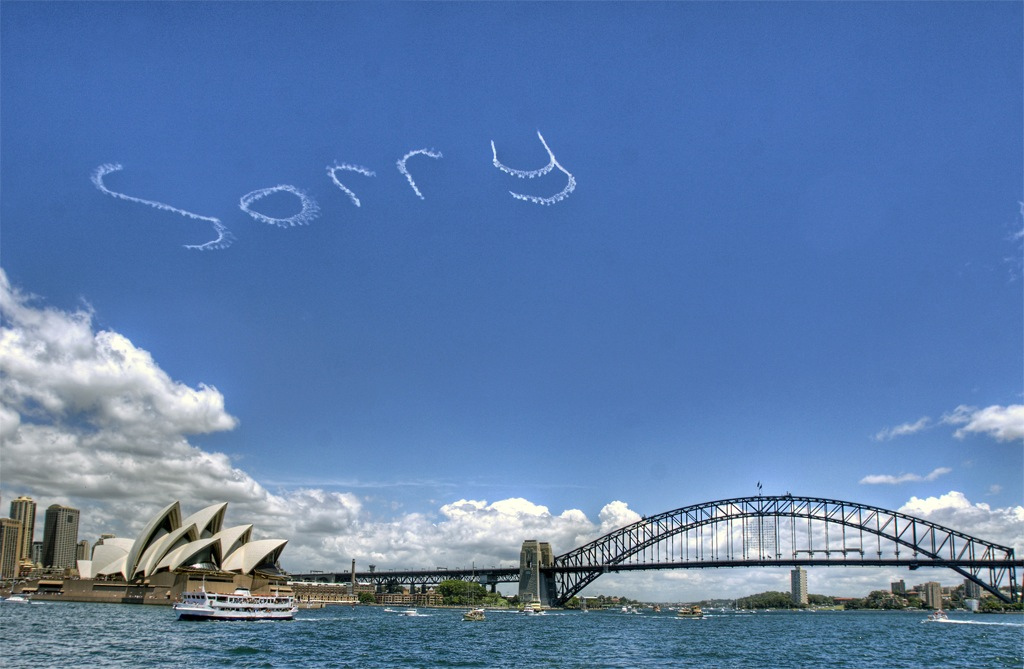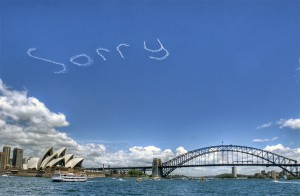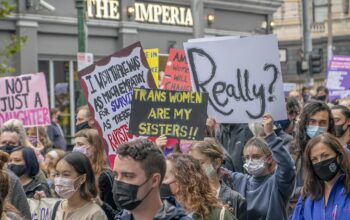This story’s right, this story’s true
I would not tell lies to you
Like the promises they did not keep
And how they fenced us in like sheep.
Said to us come take our hand
Sent us off to mission land.
Taught us to read, to write and pray
Then they took the children away,
Took the children away,
The children away.
Snatched from their mother’s breast
Said this is for the best
Took them away
In 1949, Australia reluctantly signed the UN treaty on the Prevention and Punishment of the Crime of Genocide. With the horrors of World War II still freshly in mind, their reluctance had nothing to do with sympathizing with the Holocaust or lacking faith in the importance of Human Rights. Quite the opposite, Australian politicians believed that the mere idea of genocide was in such stark contrast with Australian values of fair play, mateship and equal opportunity, that it was needless to state that it could never happen. Having to sign the treaty was almost humiliating.
When the treaty took effect on January 12th of 1950, Australian politicians could pat each other on the back. Australia was clearly making headway in shaking off the label of a God-forsaken colony and claiming seats around the tables where decisions were being made. Meanwhile the treaty didn’t change anything about the genocide that had been going on for over forty years and would continue undisturbed well into the 1970s.
Forced removals of children of mixed racial descent, who were then known as half-caste and now as the stolen generations, is one of the most public secrets of the Western community. It is the story of state-level domestic violence, that is explained away with “they really didn’t mean it” and when revealed, labelled as misguided but well-intended. It took almost a century to be admitted and apologised for, and it seems to require more years to be called for what it was – a genocide.
What happened to the stolen generations, and the lack of public outrage around it, was just one more chapter in a series of horror stories known as Australia’s indigenous history. The policies and practises that together made up the stolen generations agenda, differed from state to state and evolved from decade to decade. They didn’t always portray the public understanding of a genocide – a Holocaust-like absolute and violent mass destruction of an ethnic group – but the damage caused by removing children from their primary carers and indigenous communities was excruciating and indisputably wrong.
Children were taken away from their families under the excuse of their welfare, and at times, with no explanation altogether. They were then raised in state institutions or on religious missions, placed as foster children or adopted out to white families. Their connection to the families was disrupted and conditions in which they were placed were often far from perfect. Many of the children were subjected to hard labour at a young age and complaints of sexual abuse were common. They all grew up without their parents, siblings, language, culture, and identity, and carried the baggage of abuse and shattered sense-of-self into their adult lives and generations to come.
At the time, the goal of the policies was clear: the ultimate absorption of the ”half-castes” in the white Australian society, and thus solving what was often referred to as the aboriginal problem. Influenced by social-Darwinist ideas of a racial hierarchy, the indigenous Australians were labelled as genetically inferior, and a two-fold assimilation strategy was implemented. Full blooded aborigines would simply ”die out” in isolation while people with mixed descent would be ”bred out” as they were removed from the Aboriginal culture and communities, and girls would be raised and trained to become wives for lower class white men. This way, the aboriginal background would naturally give way to the superiority of the European civilisation.
The personal traumas caused were, without a doubt, immeasurable, but in the eyes of international law, there is another level to these atrocities and a name for what took place in the indigenous communities. Genocide.
The UN Genocide Convention is straight forward in the way it sets out the definition for genocide and leaves little space for interpretation. It is defined to include a variety of acts committed with intent to destroy, in whole or in part, a national, ethnic, racial or religious group, and it specifically mentions forcibly transferring children from one group to another. It is clear that even the most conservative accounts of the Stolen Generations policies perfectly qualify as a genocide under international law.
The issue of the Stolen Generations only broke into the public consciousness in the early 1990’s, with Archie Roach’s Took the children away striking a chord with the Australian public. Finally in 1997, what had started out as an indigenous movement, had gathered political weight and culminated in the publication of the findings by the National Inquiry into the Separation of Aboriginal and Torres Strait Islander Children from Their Families, a paper that became known as the Bringing Them Home report.
Since the launch of the report, the demand for an apology became the hot potato of Australian politics, but it took another 11 years before Prime Minister Kevin Rudd publicly addressed those touched by the Stolen Generations policies, apologising for the role of previous governments.
Bringing Them Home called Stolen Generations a genocide, but after that, the heaviest word of the dictionary was soon shoved aside and continues to be widely rejected. Australians’ dread the g-word and the potential it has in tearing apart the national identity that is built on the notion of shared struggles and overcoming hardships. Mainstream politicians have agreed to let the sleeping dingos lie as an attempt to avoid an extension or escalation of national shame and guilt. But just how justified is it to settle with “We can’t change what has happened, let’s look ahead and move on?” Accepting and addressing histories that show no empathy to people’s sufferings, is supposed to be difficult. Genocide is, after all, a gruesome reminder of humanity’s failure to be humane.
The mere existence of the “genocide debate” has already proven that genocide is a powerful word, and using it, faithful to its true meaning, and with all the baggage it brings along, would help put a long overdue end to belittling a national trauma and help to generate a much needed sense of urgency in the reconciliation measures.
By Ulla-Stina Henttonen
Image credit:
Picture 1: butupa, licensed under CC BY 2.0







